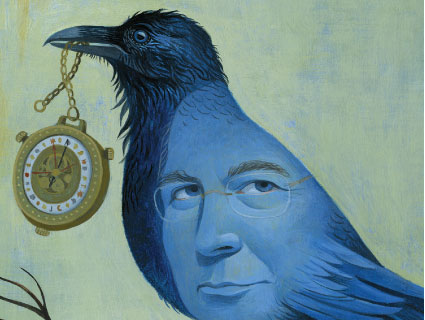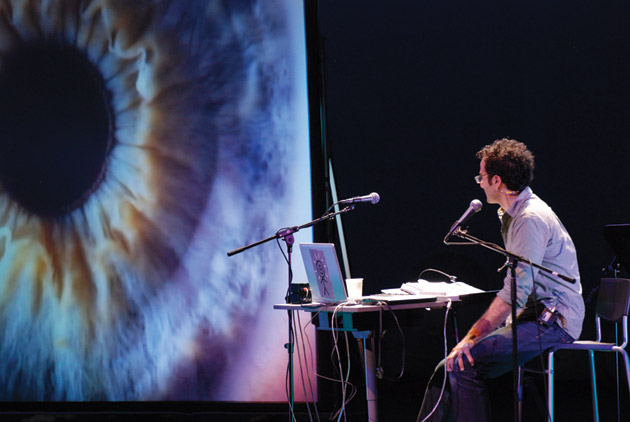
Courtesy Robin Sloan
Robin Sloan, 32, has spent the past decade tinkering on the cutting edge of digital culture. At a post-college fellowship at the Poynter Institute, before Google Maps even existed, he coded an interactive map of American journalists embedded in Iraq and co-produced EPIC 2014, a sci-fi video spin on the future of media. Later, following stints as a Current TV strategist and Twitter manager, he began spinning out his own hybrid projects like Fish: A Tap Essay—an app that delivers his musings on the difference between “liking” something and loving it—and an interactive book review whose content is revealed gradually as the reader, prompted by a video, types in JavaScript commands.
But Sloan’s latest project involved a much older medium: wood pulp. “Getting into fiction was definitely an attempt to make something more durable,” he tells me, arriving to our interview in a wrinkled lavender polo. “Right now there is no reason to believe that anything published on the internet will be around in 10 years.”
In the novel Mr. Penumbra’s 24-Hour Bookstore—with glow in the dark cover!—Sloan’s protagonist loses his startup gig and takes a job at a musty San Francisco bookstore. In this zone bereft of iPhones, pop culture, and current events, he discovers a secret society full of cryptic figures and must help crack a puzzle with the help of techie friends and a flirtatious Googler. Bay Area readers will relish the combination of crusty North Beach haunts, Silicon Valley upstarts, and relics of Renaissance publishing as Penumbra challenges their notions of old versus new—and fantasy versus reality. At its heart lies the idea that even the most complex technology is comprised of language, and also that language is perhaps our most durable technology of all.
[Listen to an excerpt from the audio book recording of Mr. Penumbra’s 24-Hour Bookstore courtesy of Macmillan Audio. Download the full audio book here.]
I caught up with Sloan in San Francisco’s SoMa neighborhood to dish on his D&D failures, life after Twitter, and his current obssession with the early days of movable type.
Mother Jones: You describe yourself as a media inventor. What’s that?
Robin Sloan: I think that you get to a certain point on the web when you realize that you can do more than just type into a box or a CMS or write another blog post. You realize the whole screen is essentially elastic. You can write a blog post that comes alive. Or you can make a webpage where the images move around. I made a book review this summer that you literally had to program as you went.
MJ: Do you feel like you’ve always been an inventor type?
RS: If I look into my past, I was definitely into inventors. I was into stories of Edison and Tesla and da Vinci and all these guys making stuff in their garage. Who realized at the time what an important day it was when my dad brought home the Mac Plus when I was like eight or nine? From the day that computer showed up, I was messing around and trying, and mostly failing, to make my own. You can go as far back as fifth grade and you will find me tinkering with media and computers, making things that are a little off the beaten track. It’s not just a book report or a video game. It’s like some weird combination, and for like 20 years they didn’t quite work. And maybe it’s only recently that I actually kind of got my act together, or frankly got good enough at it that I could actually make things and put them out for everybody.
MJ: How’d you find your way to San Francisco?
RS: After a fellowship at the Poynter Institute, it was 2004, there were rumors that Al Gore was starting a TV network. Al Gore! TV network! It’s gonna use the internet. It’s gonna be participatory. For whatever reason I became convinced I had to go work at this place. So through a process of persistence and, I dunno, pestering, I managed to finagle myself a job at Current TV, which didn’t even have an office then.
MJ: Your characters in Penumbra have a lovable nerdiness about them, and fantasy plays a big role in the narrative. Did you play a lot of D&D growing up?
RS: I have a couple best friends, one of whom is very much the template for Neel [of Mr. Penumbra’s 24-Hour Bookstore] because we became friends over our shared interest in a series of books about dragons. But we used to try to play Dungeons & Dragons all the time, and it turns out it’s much better on paper than it is in reality. We would get together in one of our basements and lovingly craft these characters and figure out what they were carrying and what spells they had. But that would take three hours and I don’t know if we ever finished a game.
MJ: Did you read a lot of fantasy?
RS: Oh, yeah. In some ways I grew up in the public library in Troy, Michigan.
MJ: What were you favorites?
RS: I liked the sort of YA classics. I loved The Chronicles of Narnia. I loved The Chronicles of Prydain by Lloyd Alexander, who is amazing. Basically, “Chronicles of”—I was in. But I definitely leapt over to the adult science fiction shelf too and read stuff like Arthur C. Clarke, Isaac Asimov, the Foundation books and basically everything with dragon in the title.
MJ: I meant to look this up, but the Dragon-Song Chronicles in Mr. Penumbra—
RS: It’s not real. It was definitely intended as homage to anything and everything with the word “dragon” and “chronicles” in the title, of which there are many candidates.
MJ: Is Clay, your protagonist, based on anyone in particular?
RS: His voice is largely mine. I’d been writing a blog with a friend of mine for six or seven years at the time I started thinking about Penumbra. I had a lot of experience writing first person, trying to get that voice across, so I basically just used that voice for Clay. It seemed more salient in 2009 when I first wrote the short story, but that sense of a young person adrift and kind of getting desperate I thought was interesting. The idea of someone so desperate that they’ll do something they’d never imagined doing is just super—like, what great territory! I just remember it was 2009, so it was the jaws of this economic implosion and I remember being very compelled by that image of a perfectly smart, capable person suddenly, like, “Oh wait, what do I do now?” and where does that lead him.
MJ: This phrase that’s repeated in the novel—festina lente—what’s that all about?
RS: Festina lente should totally be a model for our age. I came across it just reading about the early days of printing and Aldus Manutius—the great printer who of course figures in the plot of my book. It’s his motto. I’m sure that you could translate it different ways—but the one I liked best is “make haste slowly.” And I just love it cuz it seems like a contradiction, but in fact it’s exactly right. It seems to fit our time really well, but I stole it from a guy 500 years old. Oh wait, maybe this isn’t new, maybe this is not a new feeling.
MJ: Yeah, I mean they probably felt oversaturated and crazy too.
RS: My great revelation, even with a little bit of research about Manutius and that era of printing, was: It was the internet! With all the confusion and competition and crazy arguments that you’d expect. I mean, we’ve got all these people today arguing, “Oh man, iPhone app,” “Naw dude, you gotta do it as a website!” You can dial it back 500 years and it’s exactly the same spirit. They were talking about like how to make ink, or what the best alloys were to use for this new type they were making, but it’s like the same guys, just transported in time. Same attitude, same personalities.
MJ: Your trajectory, from working at Twitter, seeing things fly by in 140 characters, to writing a novel—it’s kind of like you’re going backwards. Was the novel a rebellion, an escape from digital media saturation?
RS: It wasn’t a rebellion. It wasn’t an escape, because I still use those things and I’m still part of that world and I still really enjoy it. I have never thought more about the English language than I have looking at that tweet composition box, trying to put words in a different order and figure out a different way to phrase a sentence to make it fit. That thing is totally an engine for creative sentence construction and grammar and syntax. So I don’t think that that kind of stuff is an enemy of language or an enemy of storytelling.
At the same time, there’s no arguing that it’s not ephemeral. Even if you are the world’s biggest fan of Twitter and of the web in general, I don’t think you can deny that the half-life of media you make there is super short. It’s like this stream where you kind of throw things into the stream and people dip into the stream but the stream just keeps flowing and then like goes off a waterfall. So getting into fiction, and certainly writing a full-length novel, was definitely an attempt to make something that could be a little more durable.
MJ: Your book deals a lot with immortality. Do you think things being invented on the internet are in some way not going to withstand time as well as physical literary works?
RS: There’s the challenge of: Is the language and the story strong enough to survive? Things made on the internet today don’t even get to test themselves against that standard because they’re still struggling at the level of compatibility and durability. So I would say right now there is no reason to believe that anything that anyone publishes on the internet will be around in five or ten years.
Now, things are changing really fast. I’m sure in the very early days of books, people were like, “I don’t know, man, I use mine like this, to start the fire.” Books have now matured to the point where they have this durability and they also have time to demonstrate their durability. I would say the internet has done neither. It’s not going to happen on its own. I think it’s really going to take people who have an interest in archiving and in continuity and durability to start to actually maybe redesign the way these things work.
MJ: I was wondering, how do you eliminate distractions so that you could focus on writing your book?
RS: I’m so proud of my new phone (pulls out black Nokia flip phone). I canceled my AT&T plan and I’m just using this little guy, and I love it! One of the things I did—I had to do it—is I have an app called Freedom. I love Freedom. I think the thing is, and this is one of the scariest things, those distractions—Twitter, email, whatever—they become habits not even just on the level of your mind, but of your muscles. It’s either look at the phone, or, new tab, Twitter—wait, why did I just open a new tab and type in Twitter? I don’t even understand what just happened. Your brain and body have been trained to be like, (in a high voice) “Hmm, I get mildly stimulated whenever I do this!” So I think it’s important to design an environment for yourself where those things are just not options. Freedom helps, I don’t believe in like, (deeper, macho voice), “Oh, I deleted my Facebook account and Twitter account and canceled my internet and I use a typewriter.” Freedom, though. I should say on the back: “This book brought to you by Freedom.”
MJ: You write a lot about Google and Googlers. What has your interaction with Google been?
RS: I don’t know that many Googlers, I know a few. But in some ways I use Google in the book as a bit of an archetype. It’s not purely Google. It’s Google as avatar of Silicon Valley. But the reason it’s Google and not Facebook or Apple is that I actually think that even in an era that Facebook is enormous, with a billion users, and Apple is making a billion dollars a week, Google is the quintessential web company. It’s both that crazy scale and the incredible technical competence required to operate at that scale, but also this real goofiness and sense of anarchy. I don’t know, you just feel like even the Muppets could work at Google. The Muppets would not fit in at Apple, but the Muppets could work at Google, and I count that as a very positive thing.
MJ: I love how you mix together things Google is actually doing, like Street View, with the most ridiculous things, like “a form of renewable energy that runs on hubris.”
RS: Every time I’ve heard that someone had to Google something in the book to see if it was real, I’m like, “Score!” I should have a little chalkboard to notch it up. Because that to me is success. Can we do that yet? Is that a thing?
















